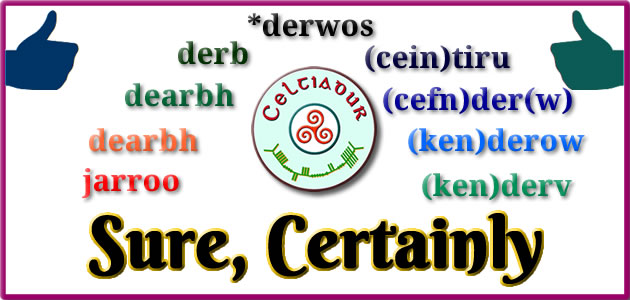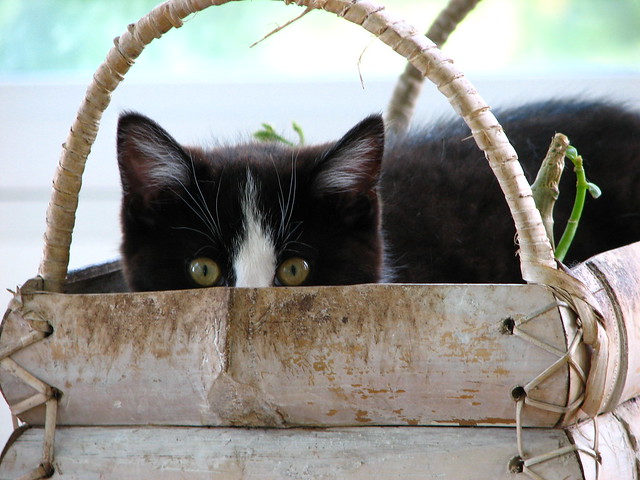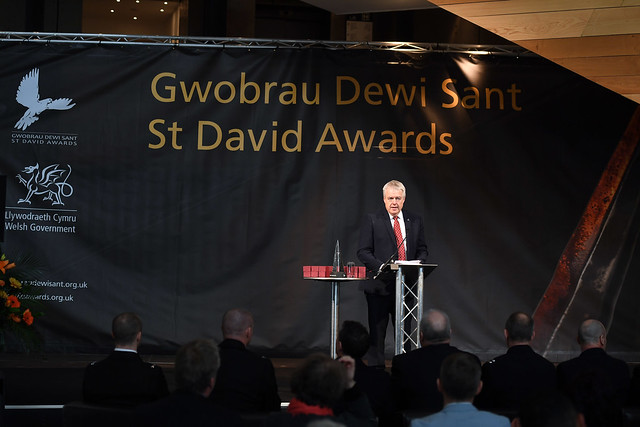Words for sure, certain and related words in Celtic languages.

Words marked * are reconstructions.
| Proto-Celtic |
*derwos = firm (as an oak), oak |
| Old Irish (Goídelc) |
derb = sure, certain, fixed, certainty
derba = certainty
derbaid = to certify, confirm, prove
derbda = certain, fixed |
| Middle Irish (Gaoidhealg) |
derb = sure, certain, fixed, determinate, reliable, genuine
derba = certainty
derbaid = to certify, confirm, prove, attest
derbda(e) = certain, fixed |
| Irish (Gaeilge) |
dearbh [ˈdʲaɾˠəvˠ] = sure, certain
dearbhaigh = to declare, affirm, confirm, attest, prove
dearbháil = to test, check
dearbhú = declaration, affirmation, attestation, confirmation
dearfa = attested, proved, sure, certain
dearfach = affrimative, positive
dearfacht = positiveness, certainty
deartháir = brother (“certain brother” from derb & bráthair [brother])
deirfiúr = sister (“certain sister” from derb & siur [sister]) |
| Scottish Gaelic (Gàidhlig) |
dearbh [dʲɛrɛv] = ceratin, sure, positive
dearbh-aithne = identity, indentification
dearbhaich [dʲɛrɛvɪç] = prove, attest, verify, demonstrate
dearbhadh [dʲɛrɛvəɣ] = proving, attesting, verifying
dearbhachd [dʲɛrɛvəxg] = proof, experience, assurance
dearbhair [dʲɛrɛvɛrʲ] = affirmer, checker
dearbhte [dʲɛrɛvdʲə] = ascertained, confirmed, proved
dearbhach [dʲɛrɛvəx] = sure, affirmative, positive
dearbhachail [dʲɛrɛvəxal] = conclusive, decisive |
| Manx (Gaelg) |
jarroo = absolute, actual, even, explicit, express, identical, indubitable
jarrooagh = affirmative, categorical, confirmative, definitive, positive
jarrooid = positiveness
dy jarroo = actually |
| Old Welsh |
ceintiru = first cousin (male) |
| Middle Welsh (Kymraec) |
keuynderv, keuyndyru, keuynderw = first cousin (male)
cyfnitherw, kefnithderw, cyvnither = first cousin (female) |
| Welsh (Cymraeg) |
derw = sure, true (only appears in words below)
cefnder(w) = first cousin (male)
cyfnither(w) = first cousin (female) |
| Middle Cornish (Cernewec) |
handeru = first cousin |
| Cornish (Kernewek) |
kenderow, keniterow = cousin |
| Middle Breton (Brezonec) |
quenderu = cousin |
| Breton (Brezhoneg) |
kenderv = cousin (male)
keniterv = cousin (female) |
Etymology: from the Proto-Indo-European *drewh₂- (steady, firm), from *dóru (tree), which possibly related to *deru-/*drew- (hard, firm, strong, solid) [source].
Words from the same roots include words for oak trees in Celtic languages, and tar, tree, trough and trim in English [source].
| Proto-Celtic |
*kengeti =to step |
| Old Irish (Goídelc) |
cingid [ˈkʲiŋʲɡʲiðʲ] = to step, proceed
do·cing = to advance, step forward |
| Middle Irish (Gaoidhealg) |
cingid, cinnid, cinnit = to step, pace, proceed, go, overcome, surpass, excel, exceed
do-cing, to-cing = to step, stride forward, advance, come |
| Irish (Gaeilge) |
cinn [cəiɲ / ciːnʲ] = to fix, determine, decree, decide
cinnte = certain, definite, mean, stingy, constant
cinnteach = fixed, definite, definitive
cinnteachaí = determinist
cinnteachas = determinism
cinnteacht = certainty, stinginess, limitation
cinntigh = to make certain, confirm, assure
cinntiú = confirmation, determination |
| Scottish Gaelic (Gàidhlig) |
cinnt [kʲĩːn̪ʲdʲ] = certainty
cinnteach = certain, definite, sure, accurate
cinnteachas = determinism
cinnteachd = certainty, actuality, assurance
cinnteachadh = checking, confirming, determining
cinntich = (to) check, confirm, determine, ascertain |
| Manx (Gaelg) |
kinjagh = constant, continual, continuous, definite |
Etymology: possibly from Proto-Indo-European *(s)keng- (limp) [source].
Words from the same roots include words for step in Celtic languages, shank in English, hinken (to limp, hobble) in Dutch and German [source].
| Middle Welsh (Kymraec) |
dyogel, diogel = safe, secure, certain, sure, reliable, immovable
diogelu = to make save, secure
diogelhay = to make safe or fast, secure, assure
diogelrwydd, diogelrỼyd = safety, security, assurance, certainty
diogelwch = safety, security, caution
diogelwr = defender, protector |
| Welsh (Cymraeg) |
diogel [dɪˈɔɡɛl/dɪˈoːɡɛl] = safe, secure, certain, sure, reliable, immovable
diogelaf, diogelu = to make save, secure, assure, confirm
diogeldeb, diolgelder = safety, security
diogelfa = safe place, fortress, stronghold, place of refuge
diogelhaf, diogelhau = to make safe or fast, secure, assure
diogelrwydd = safety, security, assurance, certainty
diogelwch = safety, security, caution
diogelwr, diogelydd = defender, protector |
| Middle Cornish (Cernewec) |
diogel, dyowgel, dyogel, diûgel, diougel = unexposed, secure, safe, certain |
| Cornish (Kernewek) |
diogel = certain, reliable, secure, sure
diogeldeh = security
diogeli = to safeguard, secure |
| Middle Breton (Brezonec) |
diouguel, dioguel, dyougel = certain, sure, surely, security, safety
diouguelhat = to defend, guard, protect
diouguelroez, dyouguelroez = security, protection |
| Breton (Brezhoneg) |
diogel [diˈoːɡɛl] = size, dimension, measure, format
diougelaat = to defend, guard, protect
diougeladur = affirmation, assertion
diougeler = protecter
diogeliñ = to assert
diogelroez = security, protection
diogelus = affirmative |
Etymology: from di- (intensifying prefix) and gogel (to guard), from Proto-Celtic *uɸo- (sub-, under) and *kelo (to hide), from PIE *ḱel (to cover) [source].
Words from the same roots include Celt(ic), heel and occult in English [source].
| Scottish Gaelic (Gàidhlig) |
sicir [ʃiçgʲɪrʲ] = shrewd, acute, accurate, sure
sicireachd [ʃiçgʲɪrʲəxg] = shrewdness, acuteness, accurateness, sureness |
| Manx (Gaelg) |
shickyr = certain, confident, definite, firm
shickyraghey = to ensure, ratify, verify, affirmation
shickyrys = assurance, certainty, security, stability |
| Middle Welsh (Kymraec) |
sicr, sikr = safe, secure, certain, sure, reliable, immovable
sickrwydd, sicrwydd, siccrwydd = certainity, sureness, assurance
siwr, sywr = sure, certain, inevitable, unfailing |
| Welsh (Cymraeg) |
sicr [ˈsɪkɪr] = sure, certain, inevitable, secure, safe
sicrhau = to ensure, make certain, fasten, secure
sicrwydd = certainity, sureness, assurance
siŵr, siwr [ʃuːr]= sure, certain, inevitable, unfailing
siwr(i)af, siwr(i)o = to assure, ensure
siwrans, siwrens = certainity, assurance |
| Middle Cornish (Cernewec) |
secer = secure
secerder = security |
| Cornish (Kernewek) |
sur = certain(ly), sure(ly)
surhe = to assure, ensure, insure
surheans = insurance
surneth = certainity
surredi = certainly, surely |
| Middle Breton (Brezonec) |
sigur = sure, certain, assured |
| Breton (Brezhoneg) |
sygur, sigur [ˈsiːɡyr] = sure, certain, assured
siguriñ = to generalize, pretext |
Etymology: from Middle English siker (safe, secure), from Old English sicor (secure, safe, sure), from Proto-West Germanic *sikur (secure, safe, sure, certain), from Latin sēcūrus (worryless; carefree; secure), from sē- (without) and cūra (care); [source].
Note: the Welsh word sikr comes from Middle English siker, while siŵr/siwr comes from modern English sure. They both come from the same ultimate roots. Similarly, the Middle Cornish secer comes from Middle English, while sur in modern Cornish comes from modern English. I’m not sure if the Breton words are related, or what their etymology is.

Sources: Wiktionary, Am Faclair Beag, Online Manx Dictionary, Teanglann.ie, eDIL – Electronic Dictionary of the Irish Language, In Dúil Bélrai English – Old Irish glossary, Geiriadur Prifysgol Cymru, Gerlyver Kernewek, Gerlyvyr Cernewec, Lexicon Cornu-britannicum: A Dictionary of the Ancient Celtic Language of Cornwall, Dictionaire Favereau, TermOfis, Le dictionnaire diachronique du breton, Geriafurch, English – ProtoCeltic WordList (PDF), Etymological Dictionary Of Proto Celtic






